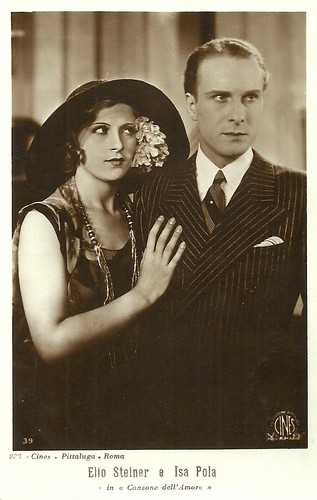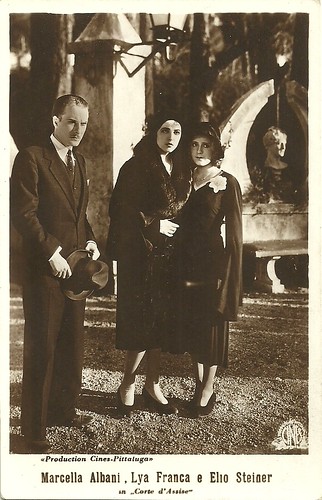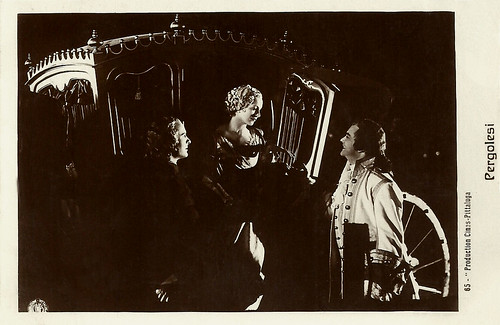
Italian postcard by G.B. Falci, Milano. Photo: Cines Pittaluga / ACIEP.

Italian postcard by Ed. G.B. Falci, Milano, no. 39. Photo: Cines. Pittaluga, Roma. Isa Pola and Elio Steiner in La canzone dell'amore/The Song of Love (Gennaro Righelli, 1930).

French postcard by Europe, no. 993. Photo: Produzione Pittaluga Cines Roma.
The protagonist of the first Italian sound film
Elio Steiner was born in Stra, Italy, in 1905 as the son of Francesco Steiner and Countess Elena Lupati.
He devoted himself to the theatre when still a teenager. Following his family when they moved to Rome in the first half of the 1920s, he had the opportunity to join, in 1925, the Teatro degli Indipendenti, directed by Anton Giulio Bragaglia.
Subsequently, he made his debut in silent cinema in the short film La chimera del biondo cavaliere/The chimera of the blond knight (1927), followed by the feature film La vena d'oro/The Golden Vein (1929), written and directed by Guglielmo Zorzi. Zorzi made him the protagonist opposite film diva Diana Karenne.
At the end of the twenties, he was, therefore, a young protagonist of Italian silent cinema, among which the drama Assunta Spina (Roberto Roberti, 1929) stood out, in which Rina De Liguoro and Febo Mari had the leads as Assunta and Michele.
But Steiner's real fame came in 1930 when, alongside Dria Paola and Isa Pola, he was the protagonist of the first Italian sound film: La canzone dell'amore/The Song of Love (1930), directed by Gennaro Righelli and shot at the Cines-Pittaluga studios and on location in Rome.
Here, young Lucia (Paola), who has adopted the illegal baby of her mother (who has just died) and pretends to be the baby's mother herself, breaks off her engagement with Enrico (Steiner), a promising singer. Two years after, they meet again when she has become a worker in a record shop. Enrico is still in love with her. After a series of misunderstandings and rivalry by Enrico's other girlfriend Anna (Pola), a happy end follows.

Italian postcard by G.B. Falci, Milano, no. 883. Photo: Cines-Pittaluga, Roma. After an attempted suicide, Lucia (Dria Paola) and Enrico (Elio Steiner) make up towards the end of La canzone dell’amore/The Song of Love (Gennaro Righelli, 1930). The cityscape of Rome in the background.

Italian postcard by G.B. Falci, Milano, no. 889. Photo: Cines-Pittaluga, Roma. Lucia (Dria Paola) and Enrico (Elio Steiner) hide from their friends in order to be able to kiss each other, in La canzone dell’amore/The Song of Love (Gennaro Righelli, 1930).

Italian postcard. Photo: Produzione Cines-Pittaluga. From left to right: Lya Franca, Renzo Ricci, Marcella Albani, Mercedes Brignone, and far right Elio Steiner in the courtcase melodrama Corte d'Assise/Court of Assizes (Guido Brignone, 1930), released in 1931.
Increasingly employed in secondary roles
In the early 1930s, Elio Steiner was one of the most popular Italian male actors together with Vittorio De Sica, Nino Besozzi, Gianfranco Giachetti, Sergio Tofano, Carlo Ninchi, and Mino Doro.
After La canzone dell'amore, he immediately acted in a string of films, firstly in Corte d'Assise/Court of Assizes (Guido Brignone, 1930), the first Italian sound film in the detective genre, starring Steiner himself as a reporter investigating a murder and costarring Marcella Albani and Lya Franca.
This was followed by Stella del cinema/Cinema star (Mario Almirante, 1931), where the plot was rather an excuse to showcase the work and the talent at the Cines studios. After that followed e.g. the period piece melodrama Pergolesi (Guido Brignone, 1932), with Dria Paola and Livio Pavanelli, and Acqua cheta/Still water (Gero Zambuto, 1933), starring Gianfranco Giachetti.
In 1934 Elio Steiner temporarily returned to the theatre to perform alongside Uberto Palmarini and Guglielmina Dondi in 'Caterina Sforza' and then returned to the set to act in the films Pensaci, Giacomino!/Think It Over Jack (Gennaro Righelli, 1936) based on a Pirandello play, and Giallo/Yellow (Mario Camerini, 1936).
Progressively Steiner, though, became overshadowed by emerging stars such as Amedeo Nazzari, Fosco Giachetti, Leonardo Cortese, Gino Cervi, Rossano Brazzi, and Raf Vallone, and lost his leading roles. Suffering from incipient baldness, he was increasingly employed in secondary roles, e.g. in the Propaganda film, Giarabub (Goffredo Alessandrini, 1942) about the Italian army besieged in a Libyan fortress by the Britains.
The day after 8 September 1943 he was among the most active in trying to reorganise the Republican film industry in Venice but the outcome was disappointing. Steiner only acted in one released film, Aeroporto (Piero Costa, 1944), mostly shot at Montecatini Terme. The film had only a limited release in early 1945.
Steiner returned to the screen from 1946, first as the evil James Milligan in Senza famiglia/Without Family (Giorgio Ferroni, 1946), He was now confined to character roles. His career would continue with dignity until the end of the fifties, with parts in mostly forgotten films but also La signora senza camelie/Camille Without Camelias (Michelangelo Antonioni, 1953).
Elio Steiner died in 1965 in Rome, Lazio, Italy. He was 61.

Italian postcard by G.B. Falci, Milano. Photo: Cines-Pittaluga.

Italian postcard. Photo: Cines-Pittaluga. Marcella Albani, Lya Franca and Elio Steiner in Corte d'Assise (Guido Brignone, 1930), the second Italian sound film, after La canzone dell'amore, and one the first Italian court case crime stories.

Italian postcard by G.B. Falci, Milano, no. 65. Photo: Cines-Pittaluga. Dria Paola as Maria in Pergolesi (Guido Brignone, 1932). The man left could be Elio Steiner as Pergolesi.

Italian postcard by ASER (A. Scarmiglia Edizioni, Roma), no. 123. Photo: Pesce. Could be for the film Giarabub (1942).
Sources: Wikipedia (Italian and English), and IMDb.
No comments:
Post a Comment